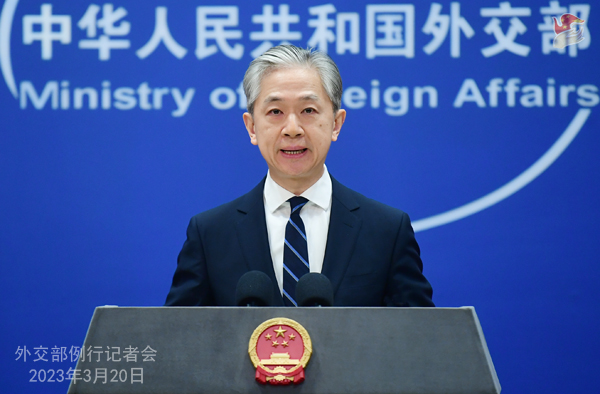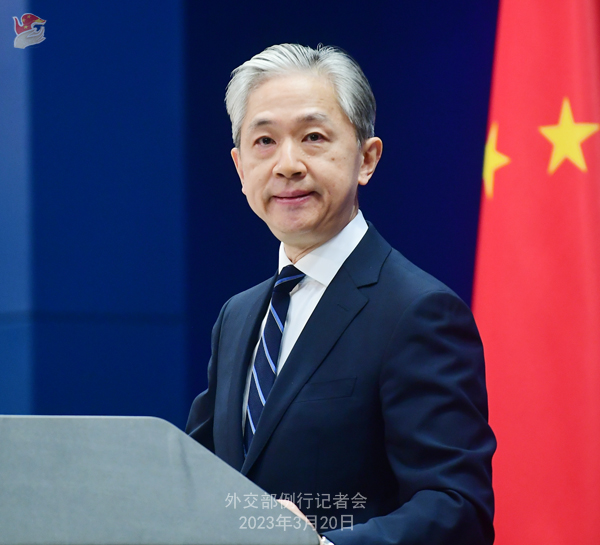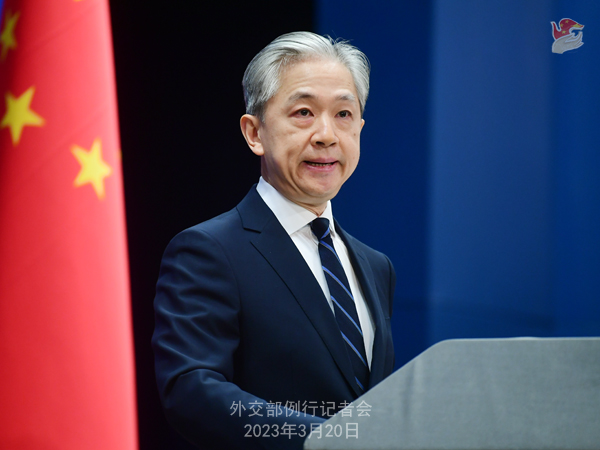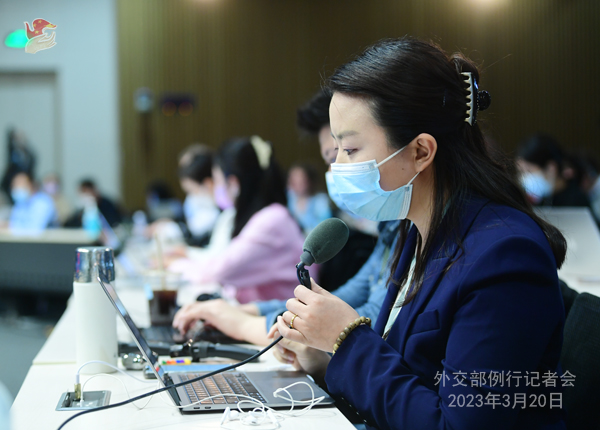
At the invitation of State Councilor and Foreign Minister Qin Gang, New Zealand Foreign Minister Nanaia Mahuta will visit China from March 22 to 25.
Sky News: In the last few days, the International Criminal Court has issued an arrest warrant for President Putin. He’s also been videoed walking around Mariupol where there’s evidence of war crimes having been committed by his troops. China would say it’s against things like illegal invasion and war crimes. So how can it justify the visit of President Xi going ahead this week?
Wang Wenbin: Our position has always been that dialogue and negotiation provides the fundamental way out for the Ukraine crisis, and that the international community needs to play a constructive role in peacefully resolving the Ukraine crisis, and do more in ways that are conducive to talks for peace, deescalation and mediation efforts. The ICC needs to take an objective and just position, respect the jurisdictional immunity of a head of state under international law, prudently exercise its mandate in accordance with the law, interpret and apply international law in good faith, and not engage in politicization or use double standards.
As for President Xi Jinping’s state visit to Russia, we shared information with you last week. I want to reiterate that President Xi’s visit is a trip for friendship, a trip for cooperation and a trip for peace.
President Xi Jinping will have an in-depth exchange of views with President Putin on bilateral relations and major international and regional issues of mutual interest, jointly promote strategic coordination and practical cooperation between the two countries and provide new impetus for the growth of bilateral relations. The two sides will, on the basis of the principles of no-alliance, no-confrontation and no-targeting at any third party, practice true multilateralism, work for greater democracy in international relations, build a multi-polar world, improve global governance and contribute to the development and progress of the world. China will uphold an objective and fair position on the Ukraine crisis and play a constructive role in promoting talks for peace.
People’s Daily: The just-concluded “two sessions” have drawn widespread attention from the international community. It’s a widely shared view that the “two sessions” provide an important window into China’s model of democracy, which shows that whole-process people’s democracy under the leadership of the Communist Party of China has broad and firm support from the people and that China has found a successful path to democracy that suits China’s realities. Do you have any comment?
Wang Wenbin: The system of people’s congresses is an important system aimed to realize whole-process people’s democracy in China. The Chinese People’s Political Consultative Conference (CPPCC) is an important form for developing socialist democracy and practicing whole-process people’s democracy in China’s political life. The “two sessions” are a concrete practice of whole-process people’s democracy. Whole-process people’s democracy is reflected not only in the complete system design, but also in the functioning and good effect of the system. It is a model of democracy that covers all aspects of the democratic process and all sectors of society. It is a true democracy that works.
Whole-process people’s democracy runs through each and every link of the “two sessions”, including elections, consultations, decision-making, management, and oversight. Deputies of the National People’s Congress (NPC) and members of the CPPCC from different regions, industries, sectors and with different ethnic backgrounds gathered together to discuss national policies and plans, which fully reflects the will of the people. At the “two sessions” this year, new leaders of state institutions and the National Committee of the CPPCC were elected and appointed. In particular, Comrade Xi Jinping was unanimously reelected President of the People’s Republic of China (PRC) and Chairman of the Central Military Commission of the PRC, which reflects the common will of all NPC deputies and the shared aspiration of Chinese people from all ethnic groups. Through fact-finding trips, conversations and other means, they got a deep understanding of what the people want, and reflected it in their motions, suggestions and proposals. Surveys show that the issues that the public cared most about during the “two sessions” were education and human resources, social security, fighting corruption, rural revitalization, the employment-first policy and medical care and health. These are also high priorities for the NPC deputies and CPPCC members and in the government report. In the past five years, the Chinese government adopted more than 18,000 suggestions and proposals from national lawmakers and political advisors, and subsequently introduced more than 7,800 policy measures, which boosted solutions to a large number of problems related to reform and development, as well as people’s urgent needs.
China’s whole-process people’s democracy is widely commended in the world. Sommad Pholsena, Vice President of the Lao National Assembly, noted that the achievements in China’s socioeconomic development would not have been possible without whole-process people’s democracy under the CPC’s leadership, and China’s democracy is aimed to bring tangible benefits to the Chinese people. Chairman of the Kuhn Foundation Robert Lawrence Kuhn noted that China’s democracy is no verbal mirage, and it is practiced to ensure that development is for the people and by the people and that its fruits are shared by the people. Columnist Iara Vidal of the Brazilian magazine Revista Fórum, after analyzing and comparing data related to the topics the Chinese and US legislatures focus on respectively, has come to the conclusion that lawmakers in Washington are preoccupied with dealing with issues of individualism, but Chinese NPC deputies in Beijing discuss issues that affect people’s daily life, such as development, the economy and democratic consultation. Many international observers noted that the successful model of China’s whole-process people’s democracy provides useful experience for other countries in the world, especially developing countries.
According to a survey conducted by a well-known international institution in China, more than 90 percent of respondents are satisfied with their government for years running. This is the most telling evidence of the strong vitality in China’s democracy. Facts have proven that China’s democracy truly works. It enables the more than 1.4 billion Chinese people, or nearly one-fifth of the world’s population, to truly become masters of their country and enjoy extensive rights and freedoms, blazing a new trail for humanity’s cause of democracy. We will continue to forge ahead steadfastly along this path of whole-process people’s democracy.
Yonhap News Agency: The ROK-China-Japan Trilateral Summit Meeting hasn’t been held for three years since 2019. What is China’s position on resuming the summit this year?
Wang Wenbin: China, Japan and the ROK are close neighbors and important development partners for each other. China-Japan-ROK cooperation serves the common interests of the three parties and meets the expectations of countries in the region. China has always taken an active part in the cooperation between the three countries. We support the proposal by the ROK, chair of the China-Japan-ROK cooperation, on hosting the trilateral summit meeting and would like to maintain communication and coordination with the ROK and Japan on this proposal. The three countries need to work together to ensure stable and sustained development of the trilateral cooperation and promote peace, stability and prosperity in the region.

Xinhua News Agency: Could you share more on New Zealand Foreign Minister Nanaia Mahuta’s visit to China that was just announced?
Wang Wenbin: China and New Zealand are each other’s important cooperation partners. The year 2022 marked the 50th anniversary of the establishment of diplomatic relations between our two countries. Over the past half century or so, bilateral ties have enjoyed sound and steady growth, creating many “firsts”, delivering benefits to both peoples through cooperation in various fields, and making important contribution to regional peace, stability and prosperity.
During Foreign Minister Nanaia Mahuta’s visit to China, State Councilor and Foreign Minister Qin Gang will hold talks with her for a comprehensive, in-depth exchange of views on China-New Zealand relations and international and regional issues of mutual interest. We hope this visit will be an opportunity for both sides to deliver on our leaders’ important common understandings, enhance communication, mutual trust and cooperation on the basis of mutual respect, mutual benefit and seeking common ground while shelving differences, further enrich our comprehensive strategic cooperative partnership, enable the relationship to achieve even more in the next 50 years, and deliver more benefits to both countries and peoples.
Global Times: Recently, UN Special Rapporteur on unilateral coercive measures Alena Douhan expressed her concerns in a statement, noting that the US’s unilateral coercive measures like prohibiting entry into the US and freezing any assets with a US connection violate basic human rights of individuals and entities concerned including labor rights and freedom of movement. These measures may be incompatible with international human rights standards, she added. At the 52nd session of the Human Rights Council, Special Rapporteur on the right to food Michael Fakhri said that some countries today would only focus on unilateral coercive measures, which almost always resulted in human rights violations and weakened the ability of countries hit by those measures to respond to food crises. What’s China’s comment?
Wang Wenbin: The concerns voiced by the UN special rapporteurs on unilateral coercive measures and the right to food call for attention from the international community. The US and some other Western countries claim to be “beacons of human rights”, but they have been imposing unilateral sanctions in the name of human rights and gravely violating other countries’ human rights. Relevant sanctions disrupt international economic, trade and sci-tech cooperation, threaten global food, energy and financial security, plunge the sanctioned countries into economic, social and livelihood difficulties, and even cause humanitarian crises. When countries were confronting ravaging COVID and natural disasters like powerful earthquakes, the US and some Western countries still refuse to remove unilateral sanctions. According to statistics, economic, financial and trade blockade the US has imposed on Cuba for over 60 years has cost Cuba over $154.2 billion. During the height of the pandemic in Iran, US unilateral sanctions, depriving the people of healthcare resources, could have caused up to 13,000 deaths. The US and some other Western countries must take responsibility and be held accountable for the systemic violation of human rights resulting from their unilateral sanctions.
The abuse of unilateral sanctions stems from power politics and the law of the jungle. It gravely violates the purposes and principles of the UN Charter, the basic principle in international law of sovereign equality, and the basic norm governing international relations of non-interference in internal affairs. Rejecting unilateral sanctions is a longstanding and consistent appeal of the international community. Multilateral human rights institutions need to prioritize issues related to unilateral sanctions and take them seriously. We urge the US and other Western countries to face up to the call for justice in the world, immediately remove unilateral sanctions, respect other countries’ human rights and respect the international rule of law.
Bloomberg: The World Health Organization has called on China to fully share genetic data that may help discern the origins of COVID-19 after this data appeared briefly on the GISAID international database and then disappeared. Will China share this data?
Wang Wenbin: As to your questions about the specifics, I would refer you to the competent authorities.
Let me share with you China’s consistent position on origins-tracing again. We have supported and participated in global cooperation on science-based origins-tracing from the very beginning. We have invited WHO experts to China for origins-tracing cooperation several times and relevant agencies and experts have shared data and research findings with the WHO, making important contributions to science-based global origins-tracing. China will continue to support and participate in global cooperation on science-based origins-tracing. In the meantime, the international science community has provided clues that point possible COVID origins to various parts of the world. We also hope that the WHO and countries concerned will share with China and the world the research findings of origins-tracing concerning other parts of the world in a timely manner.

Reuters: Ma Yingjiu, former leader of the Taiwan region, plans to visit central China from March 27 to April 7. His trip is mostly about student exchanges and tomb sweeping, but he is also open to meeting the leaders of the mainland. Would senior officials be open to meeting Ma?
Wang Wenbin: I have noted that the spokesperson of the Taiwan Affairs Office of the State Council has made a statement. You may refer to that.
CCTV: According to reports, the US is adding diplomatic pressure on Honduras right after President Xiomara Castro expressed readiness to establish diplomatic ties with China and is persuading Honduras to change its mind before signing a formal agreement. What’s China’s comment?
Wang Wenbin: The fact that 181 countries in the world have established diplomatic ties with China on the basis of the one-China principle fully shows that having diplomatic ties with China is the right choice that accords with the trend of history and our times. China welcomes the positive statement by the Honduran government on developing relations with China, and stands ready to establish and grow bilateral relations on the basis of equality and mutual respect. In recent years, China has established or resumed diplomatic ties with Panama, the Dominican Republic, El Salvador, and Nicaragua. The positive progress of bilateral practical cooperation has delivered huge benefits to the people of these countries.
Every sovereign state has the right to independently choose to develop diplomatic relations with another sovereign country. Other countries have no right to interfere in that. If what has been reported about US diplomatic pressure on Honduras is true, then the US statement that “Countries have to make their own sovereign decisions about their foreign policies” will be nothing but empty talk. The US itself established diplomatic ties with China more than 40 years ago on the basis of recognizing the one-China principle. What right or justification does the US have for denying and jeopardizing other countries’ right to establish and grow relations with China? The US needs to abandon the outdated Monroe doctrine, truly respect countries’ right to independently make their foreign policies, and stop interfering in the sovereign affairs of relevant countries.
The Paper: According to reports, China delivered a joint statement on the 75th anniversary of the adoption of the Universal Declaration of Human Rights on behalf of a group of countries at the 52nd session of the Human Right Council. Could you offer more on that?
Wang Wenbin: China delivered a joint statement on the 75th anniversary of the adoption of the Universal Declaration of Human Rights on behalf of over 70 countries at the 52nd session of the Human Right Council. It highlighted the notable progress made by the international community through continuous efforts towards attaining the lofty goals set out in the Declaration adopted 75 years ago while acknowledging the complex and daunting challenges ahead. It put forward a four-point proposal on further implementing the Declaration. First, economic, social and cultural rights and the right to development are as important as civil and political rights and should therefore be accorded equal emphasis and advanced in a balanced manner. Second, in promoting the right to development, it is important to take a people-centered approach, protect the rights of vulnerable groups, combat all forms of discrimination, lift unilateral coercive measures, and effectively tackle inequality. Third, given the varying history, culture, social system, and socioeconomic development level of different countries, the principle of universality of human rights needs to be married with specific national realities and the human rights development path independently chosen by any country should be respected. Fourth, all parties need to work on building consensus and accumulating mutual trust, reject confrontation and division, and avoid politicizing or instrumentalizing human rights so as to jointly advance the global human rights cause and inject fresh impetus into efforts to implement the Declaration.
As global issues keep popping up, the international human rights cause faces severe challenges. The joint statement is of positive significance for global efforts to better promote and protect human rights and enhance and improve global human rights governance. It reflects the strong aspiration of the international community, especially the vast developing world. China stands ready to join hands with all sides to uphold the common values of humanity featuring peace, development, equity, justice, democracy and freedom, engage in human rights exchange and cooperation on the basis of equality and mutual respect, and actively participate in global human rights governance so as to promote the all-round development of the human rights cause and build a community with a shared future for mankind.

AFP: Nine Chinese workers were killed in an attack in the Central African Republic. Do you have more details on this?
Wang Wenbin: On March 19 Beijing time, an armed attack on a Chinese private company in the Central African Republic killed nine and severely injured two others — all Chinese nationals. General Secretary Xi Jinping has given it his full attention and personally instructed that every effort be made to save the lives of the injured, make timely and proper arrangements for dealing with the aftermath of the attack, make sure that the perpetrators are brought to justice and ensure the safety of Chinese nationals.
The Foreign Ministry sprang to action upon General Secretary Xi’s instruction. We immediately activated the consular emergency response mechanism and put teams on duty around the clock. A diplomatic representation has been made to the Embassy of the Central African Republic in China. Our ambassador to the Central African Republic has raised the incident with the Central African Republic side, urging them to act. A working group from the embassy has rushed to the site to coordinate the response to the attack.
Some countries in Africa and elsewhere are currently facing high security risks. The entire Central African Republic, with the exception of its capital Bangui, is rated red (meaning extremely high) in terms of security risks. Over the past few months, the foreign ministry has issued several security alerts and urged Chinese nationals and companies to leave high-risk areas as quickly as possible and keep themselves safe. Once again, we strongly urge our fellow Chinese who are currently abroad to make sure to stay informed of the latest security alerts from the foreign ministry and take these alerts very seriously, and stop visiting high-risk areas. Those who are already in those areas need to leave at once. The foreign ministry will continue to work closely with other government agencies concerned and subnational governments to do everything possible to protect the safety and security of Chinese nationals and companies in Africa, including directing our embassies and consulates overseas to take further effective steps in this regard.
CCTV: According to reports, US government sources said on March 17 that the US has confirmed that rounds of Chinese ammunition have been used in battlefields in Ukraine and suspects they were fired by Russian forces. Whether the ammunition was supplied by China remains unclear, the sources said, while adding Washington is poised to take action if it is verified Beijing made the shipments. The US has notified some of its partners about the confirmation. What’s China’s comment?
Wang Wenbin: China has held an objective and just position on the Ukraine issue. Everything we have done boils down to supporting talks for peace. We always stand on the side of peace and dialogue and on the right side of history. We will continue to play a constructive part in facilitating a political settlement of the crisis.
As to the comments from sources within the US government, I need to stress that it is the US, not China, that has been sending weapons to the battlefields in Ukraine. The US needs to stop fueling the fight with more weaponry and fanning the flame, stop pointing fingers at other countries or seeking to coerce and intimidate them, and play a constructive role in the political settlement of the Ukraine crisis, rather than the opposite.
CRI: The Organization of Islamic Cooperation (OIC) recently held a ministerial meeting in Nouakchott, the capital city of Mauritania. The meeting spoke highly of the progress in China-OIC cooperation in recent years and the major outcomes in Saudi Arabia-Iran talks in Beijing. What’s your comment?
Wang Wenbin: The 49th session of the OIC Council of Foreign Ministers adopted text that spoke positively about China. It recognized the good progress of OIC-China cooperation and said that the OIC looked forward to further cooperation with China. We deeply appreciate this. The meeting also particularly welcomed the normalization of diplomatic ties between Saudi Arabia and Iran which was achieved with China’s support. This fully shows that solidarity and friendship among Islamic countries is a common aspiration that they and China share.
China and the Islamic world enjoy traditional friendship. The two sides firmly support each other in defending core interests and have engaged in fruitful Belt and Road cooperation. China will continue to implement the Global Development Initiative, the Global Security Initiative and the Global Civilization Initiative with Islamic countries and jointly promote world peace, stability and sustainable development.
The OIC is the symbol of solidarity of Islamic countries. China will continue to strengthen communication and cooperation with the OIC, help the member states enhance their capacity building in public health and other areas of development, and work toward new progress in bilateral relations.

Anadolu Agency: Earlier this month, we have witnessed China acting as a mediator in agreement between Iran and Saudi Arabia. As President Xi starts a state visit today to Russia, can we expect a similar role, for example, like dealing a ceasefire between Russia and Ukraine?
Wang Wenbin: On this question, we have made China’s position clear on multiple occasions. China always stands on the side of peace and dialogue. We will continue to play a constructive part in the political settlement of the Ukraine crisis.
China Daily: A Chinese foreign ministry official is said to be traveling to the Philippines for bilateral consultation soon. Could you confirm this and perhaps share more information?
Wang Wenbin: From March 22 to 24, Vice Minister of Foreign Affairs Sun Weidong will travel to the Philippines to co-chair with Undersecretary of the Department of Foreign Affairs of the Philippines Theresa P. Lazaro the 23rd China-Philippines diplomatic consultation and the seventh meeting of the Bilateral Consultation Mechanism on the South China Sea.
This will be the first face-to-face bilateral consultation between the foreign ministries since COVID-19 began. The two sides will compare notes on implementing our presidents’ important common understandings reached during President Ferdinand Marcos Jr.’s January visit to China and on advancing cooperation in priority areas. The two sides will also have in-depth communication on properly handling maritime disputes and advancing practical maritime cooperation, and exchange views on international and regional issues of shared interest. We hope and believe that this round of consultation will help enhance mutual understanding and trust and bring about closer communication and coordination between the two sides, and galvanize joint efforts for the sound and steady growth of bilateral ties.
Shenzhen TV: Twenty years ago today, the US waged the war on Iraq on the ground that Iraq possessed weapons of mass destruction (WMDs). The war killed more than 200,000 civilians and displaced more than nine million. But facts later proved that Iraq’s possession of WMDs was a false allegation. How do you see the lessons of the Iraq War? How should the international community prevent such incidents from happening again?
Wang Wenbin: The US decision to wage the Iraq War was based on a lie. The war wreaked havoc on Iraq and the Middle East, and had a devastating impact on world peace and stability. The lessons are profound, which warrant deep reflection by the US and vigilance from the entire world.
Hegemonism must be firmly rejected. The Iraq War was provoked by the US entirely to serve its geopolitical agenda, costing the region and the whole world dearly and fully revealing the truth and enormous perils of US hegemony. Countries need to jointly say no to hegemonism by taking firmer and stronger action against it, to make sure that never again will a country’s sovereignty be violated on the ground of baseless lies and allegations, and never again will any country be bullied and denied its right to development.
The international rule of law must be firmly defended. The US waged the war against a sovereign state without the mandate of the UN Security Council, undermining the UN-centered international system and blatantly trampling on the basic norms of international relations underpinned by the purposes and principles of the UN Charter. Facts have proven that the “rules-based international order”, which bypasses the UN and international law, is just another way of sugarcoating the “might-is-right” approach and the law of the jungle. Only by keeping the UN firmly at the center of the international system and upholding the basic norms governing international relations can we end the frequent occurrence of the strong bullying the weak and the big bullying the small.
The right of all countries to independently explore their democratic institutions and development paths must be earnestly respected. Facts have proven time and again that a country’s democratic institution and development path cannot be imposed externally, but explored and developed by the country’s own people. Peddling one’s own model of democracy in the name of democracy is in itself undemocratic. It is concerning that the US clearly has not learned the lessons of the Iraq War, for it has since gone into the conflicts in Syria and Libya and continued to peddle US model of democracy across the world. There is reason to ask: who will pay for US hegemony in the next 20 years?
Reuters: New Zealand’s foreign minister has said that she plans to raise security concerns, such as the “illegal Russian invasion of Ukraine” with State Councilor Qin Gang. How does China plan to address her concerns about Ukraine?
Wang Wenbin: On the Ukraine issue, we always stand on the side of peace and dialogue. Our position boils down to promoting talks for peace. We always believe that political dialogue is the only way to resolve conflicts and disputes. Fanning the flames, fueling the fight, unilateral sanctions and maximum pressure would only escalate tensions and make matters worse. This does not meet the interest and the expectation of the vast majority of countries in the world. China will uphold an objective and just position on the Ukraine crisis and other international and regional hotspot issues, and continue to play a constructive role in the political settlement of the crisis.
